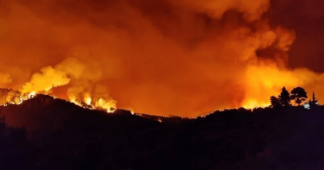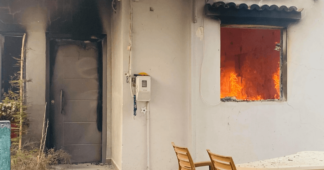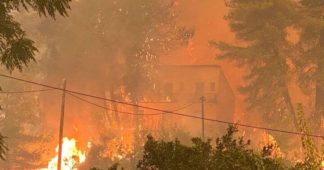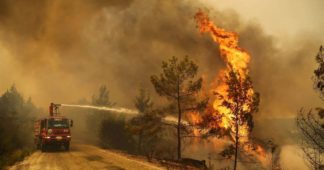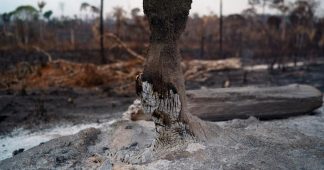Nick Kampouris
The environmental devastation from the fires in northern Evia is enormous, according to a statement issued by the meteorological service of the National Observatory of Athens (NOA) on Wednesday evening.
According to the NOA, a total of 126,023 acres (51,000 hectares or 510,000 stremmata) has been burned on the island of Evia from the beginning of the fire until Tuesday.
Evia Fires: The Scientific Data Comes from Observations from Space

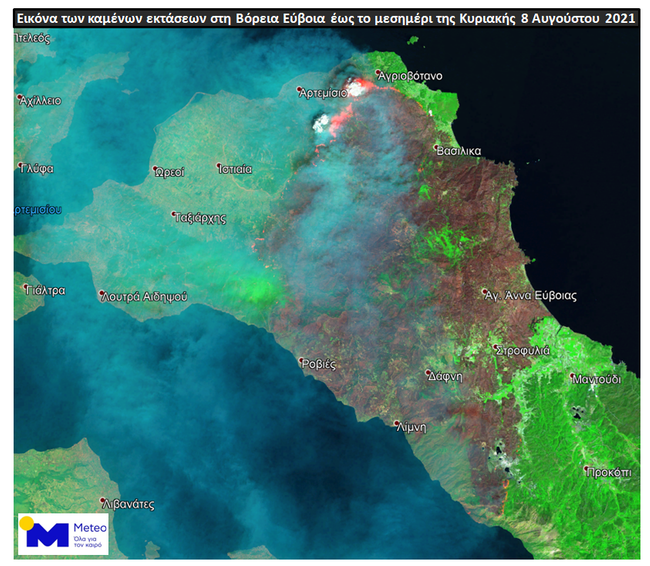
The scientists of the NOA analyzed high-resolution images produced by the European satellite belonging to the Copernicus Sentinel-2 mission.
According to the European Space Agency ESA, the Copernicus Sentinel-2 mission comprises a constellation of two polar-orbiting satellites placed in the same sun-synchronous orbit, phased at 180° to each other. It aims to monitor changes in land surface conditions.
”The European environmental satellite Sentinel-2 recorded the burned areas in Northern Evia at noon on Sunday 8 August and Wednesday 11 August,” the NOA stated in its meteo website.
According to these two recordings, the NOA found that between Sunday and Wednesday, an additional 12,355 acres of land had been burned.
On Sunday, the total area that had been burned was 113,668 acres, but on Wednesday, this number had risen to 126,023 acres of land
Evia Heads Towards Desertification
A very worrying article was published on Wednesday by Efthymios Lekkas, Professor of Dynamic Tectonic Applied Geology & Disaster Management at the National and Kapodistrian University of Athens.
In his piece, titled ”The environmental footprint of the disaster, a trek to the fire-affected areas,” Professor Lekkas notes that ”this area (Evia) is rapidly moving towards desertification.”
Lekkas claims that the geomorphology of the areas in the Peloponnese and on Evia that are now burned will ”change drastically;” however, he believes that the burned areas in Attica won’t be affected so much and could see only minor changes compared to what they looked like before the blaze.
”The risk of landslides in Northern Evia is increasing dramatically and huge consequences are expected. The same applies to the Peloponnese, to a lesser but measurable extent,” Lekkas wrote.
In terms of flooding due to uncontrolled runoff after areas have been deforested, Lekkas noted that the least affected area will be that in the Peloponnese. However, he believes that Attica, and to a greater extent Evia, will suffer significantly in the future by flooding, due to the fire destruction.
”In Attica, the flood risk is high given the human interventions in the hydrographic network,” Lekkas stated.
”However, the greatest flood risk is found in Evia, where basins that discharge water develop in areas of villages along the coastal zone,” the professor warned.
Lekkas claimed that the reforestation in the Peloponnese will be rapid, similar to what happened after the devastating fires of 2007.
”The restoration of ecosystems and especially the flora in the Peloponnese will be fast, according to the data from the fire of 2007, due to the high rainfall, fertile soils, and geological formations,” Lekkas stated.
However, Evia will face a huge problem.
”It is estimated that the 400,000 stremmata will never return to their previous state,” the professor noted.
This will be the case due to factors such as the intensity of combustion, the rugged terrain, and the rapid erosion that took and will continue to take place in northern Evia.
Lekkas teaches the subjects of tectonics, structural geology, geological mapping, earth mass-movements, microtectonics, environmental geology, seismotectonics, disaster management, tectonics, remote sensing, land use, environmental management both at the graduate and post-graduate levels
Published at greekreporter.com
